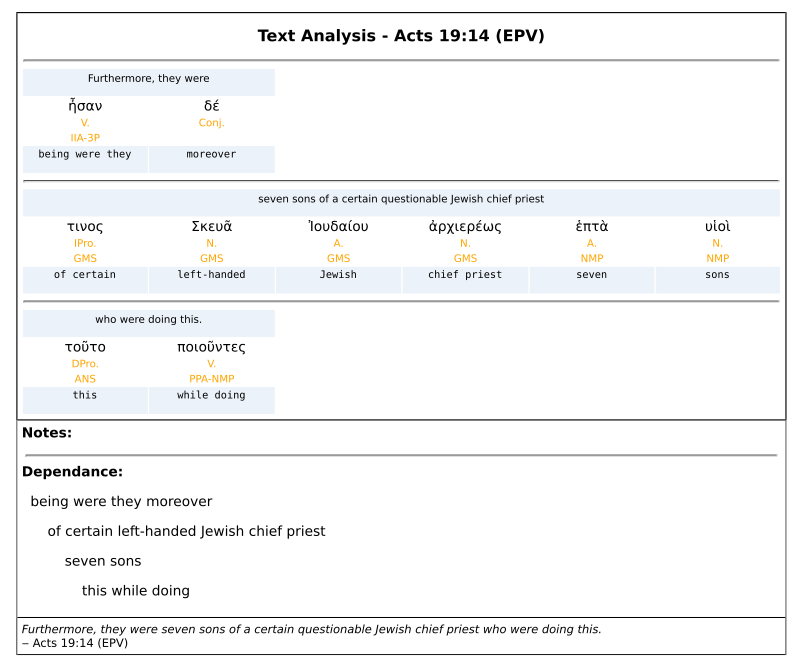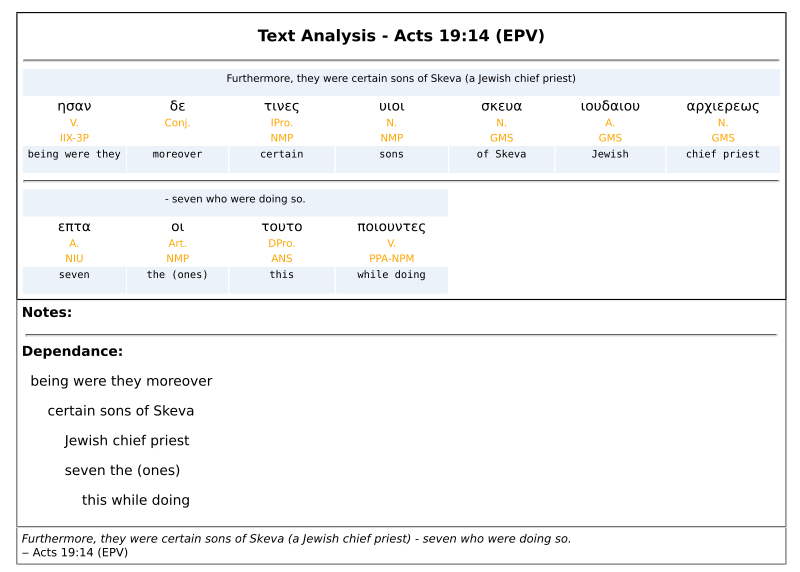The mGNT Greek of Acts 19:14 is somewhat different to the TR, and for the purpose of exploring "alternatives", here are my thoughts (whatever they might be worth).
I could get this from the mGNT:
Furthermore, they were seven sons of a certain questionable Jewish chief priest who were doing this.
Details:

And from the TR I could get this:
Furthermore, they were certain sons of Skeva (a Jewish chief priest) - seven who were doing so.
Details:

Since the OP is looking for "alternatives", then I consider that a license to think outside the box. So, I have chosen in the mGNT rendering to go with Strong's suggestion of "left-handed" as a possibility for Σκευᾶς. Left-handed, of course, being someone who is "not right".
Okay, what does one now do with something like τινος Σκευᾶ Ἰουδαίου ἀρχιερέως, a sequence of four genitives? For my mGNT rendering I have taken ἀρχιερέως as the principal noun and the other genitives standing as adjectives, giving "of a certain questionable Jewish chief priest ...". That, of course, is not the only possibility, I could have taken Ἰουδαίου as the principal noun, i.e. a Jewish (one), or a Jew, which would have given "of a certain questionable Jew - of a chief priest - ...".
With regard to "sons", the word υἱοὶ appears in both versions of the Greek, but in different places. In the mGNT, we have τινος Σκευᾶ ... ἑπτὰ υἱοὶ, i.e. "of a certain left-hander ... seven sons", but in the TR we have τινες υιοι σκευα ... επτα, i.e. "certain sons of Skeva ... seven". In regard to these sons, they could be Skeva's/the-questionable-chief-priest's progeny or his adherents - something akin to the OT "son's of the prophets.", i.e. members/students of an order or school.
For the purposes of exploring "alternatives", I have given "a questionable Jewish chief priest" for the mGNT's Σκευᾶ Ἰουδαίου ἀρχιερέως and "of Skeva (a Jewish chief priest)" for the TR's σκευα ιουδαιου αρχιερεως, but in this context I would be happy to render both as "of a questionable Jewish chief priest".
Additional Comments
Moved by the OP's comment, I have done some searching to try to discover what might have inspired Strong to suggest "left-handed" as a possibility for σκευα. I found an article by Taylor Marshall that is very enlightening. He says:
Acts 19:14 tell us about the seven sons of a “Jewish High Priest” by the name of “Sceva”. If one looks down the list of high priests, there is not a high priest in Jerusalem named “Sceva”. Biblical commentators resolve this discrepancy by stating that Sceva must have been a Jewish man who became a pagan “high priest”. I’m not ruling that out, but I find it very unlikely.
The reason for this is that the name “Sceva” is a Hellenized version of the Latin word scaeva meaning “left-handed” and by extension, “sinister” and “untrustworthy”. Lewis & Short’s Latin Dictionary also attests to a classical meaning of “perverse” or “ominous”.
Marshall goes on to suggest that this "left-handed" Jewish high priest might indeed have been Caiaphas.
Personally, I don't think αρχιερεως is here referring to the high priest since there are bunches of them appearing throughout the Gospels as αρχιερεις. For αρχιερεως to be referring to the "high priest", I would expect an article to preface it, as it is found in Matthew 26:3, for example, where the οι αρχιερεις (the chief priests) are gathered in the court-yard του αρχιερεως (of the high priest)

